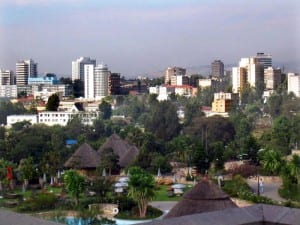 A colleague who immigrated to the U.S. when she was 12 recently told me, “When I first came to America and began learning English, I thought ‘Ethiopia’ was a type of disease.” And why not? If you came of age in the 80s or 90s, Western perceptions of Ethiopia were synonymous with drought, famine and misery – everything that’s wrong with Africa.
A colleague who immigrated to the U.S. when she was 12 recently told me, “When I first came to America and began learning English, I thought ‘Ethiopia’ was a type of disease.” And why not? If you came of age in the 80s or 90s, Western perceptions of Ethiopia were synonymous with drought, famine and misery – everything that’s wrong with Africa.
That’s just the beginning of the continent’s PR difficulties. While China and India and other countries have witnessed explosive growth and attracted huge investment from the West, Africa has remained an afterthought at best. For me personally, despite more than a decade spent both living and working in emerging markets, I’d never been to sub-Saharan Africa and didn’t have a sense of it. So when Ketchum invited me to go to Addis Ababa for the World Economic Forum’s Africa summit, I jumped at the chance.
For starters, Ethiopia is nothing like the outdated Western stereotype – Addis, its capital, is a bustling, dynamic, growing metropolis. But two and a half days of sessions, countless cocktail chatter, a hundred business cards and some challenging meals later, I was still trying to process it all. I found myself oscillating between two storylines: Africa is poised to join India and China as the next billion-person market; and Africa is poised for a failed century. The truth is somewhere in between, but it does seem that Africa is at an inflection point.
On one hand, Africa is a $1 trillion economy that will have 1.5 billion citizens by 2020, 70 percent of whom will be under 30. Its middle class is forecast to triple over the next two decades, and, in a recent survey by PricewaterhouseCoopers, more than 70 percent of global CEOs said they expected to grow their operations in Africa.
On the other hand, far too many African youth are undereducated and un- or under-employed. Africa needs to create 115 million new jobs by 2020 just to keep up, and it’s not at all clear where those jobs will come from. As former U.K. Prime Minister Gordon Brown pointed out in a one-on-one session, the continent badly trails the rest of the world in international investment, world trade, physical infrastructure and universal education.
So how can we usefully think about the issues? The first thing to bear in mind is that, while the problems are absolutely real, there are pockets of genuine growth: the so-called African “lion” economies have already grown faster than East Asian “tiger” economies eight of last 10 years, and seven of the 10 fastest growing economies in the next decade will be in Africa. Extractive industries and agriculture still dominate, but for the first time in history, western multi-nationals are betting on an expanding African middle class to drive growth. As Doug McMillon, President and CEO of Walmart International, said, “There are a lot of things to be optimistic about in the region.” That’s not mere WEF feel-good rhetoric either: Walmart has invested $2.4 billion in the continent. Tech hubs are sprouting up in places like Kenya and Ghana and are beginning to attract global investment and excitement, and a large numbers of Western-educated Africans are returning to their home countries to start successful businesses.
So growth is happening. But the head of the African Development Bank, Donald Kaberuka, set the tone for the entire forum at the opening plenary session when he pointedly noted that “economic growth does not equal transformation.” The challenge for everyone who cares about Africa – and I now count myself in that camp – is to figure out how it can transform itself into a sustainable successful market. Not an easy task, but not an impossible one either. And one that will require a lot of input from communications experts.
Key Points
Here are a few key points from policy makers, entrepreneurs and influencers that I hope can give a taste of the issues and opportunities and perhaps dispel some myths around Africa.
“We’ve moved from cynicism to skepticism to realism about Africa. Now we’re reaching a point of pragmatic optimism.”
-Klaus Schwab, Founder and Executive Chairman, WEF
“We’ve changed our mentality from handout to hand up. Now we’re entering the era of the handshake.”
-Josette Sheeran, Vice Chairman, WEF
“We have to change things so an African farmer can produce coffee beans and also taste that coffee.”
-Monhla Hlahla, Chairperson, Industrial Development Corporation of South Africa
“I would only invest in Africa today – that’s where the growth is.”
-Aliko Dangote, President and CEO, Dangote Group (and Africa’s most successful entrepreneur and richest man)
“The biggest myth about Africa is that we’re a basket case. In fact, we’re a continent of builders and innovators.”
-Juliana Rotich, social entrepreneur and co-founder/director of Ushahidi
“People think that African young people are misguided. The truth is that they’re on the front line of Africa’s transformation.”
-Yawa Hansen-Quao
“Africa is not just there for people to assist; we can manage our own affairs as well.”
-Ngozi Okonjo-Iweala, Nigerian Finance Minister
“Transformation requires relentless passion, and a combination of both patience and urgency.”
-Pravin Gordhan, South African Finance Minister
And my personal favorite from an unexpected source:
“We need to wake up every morning and be willing to fight and fight and fight.”
-Kofi Annan


